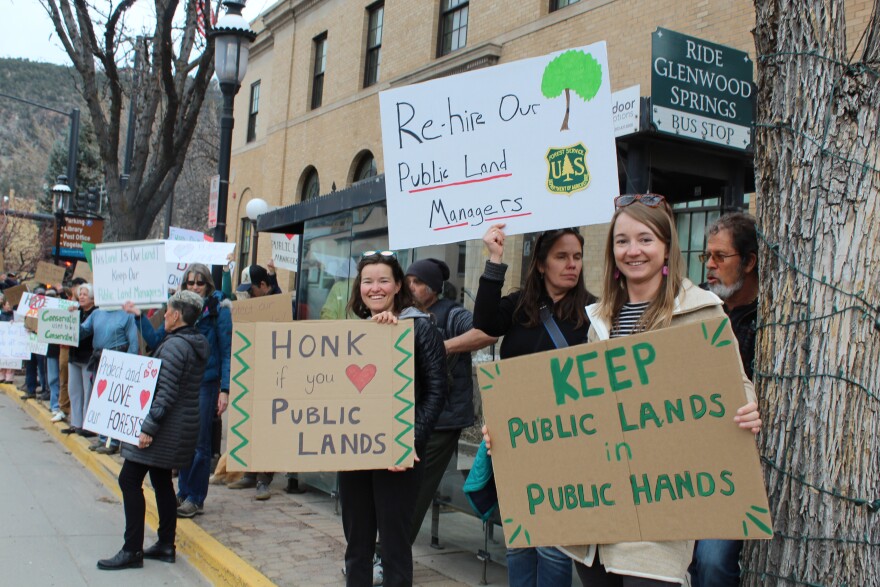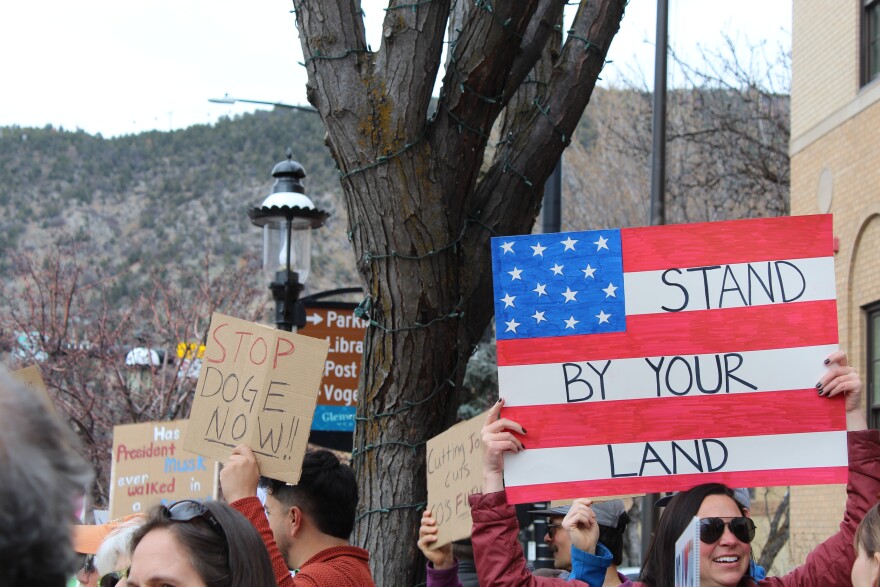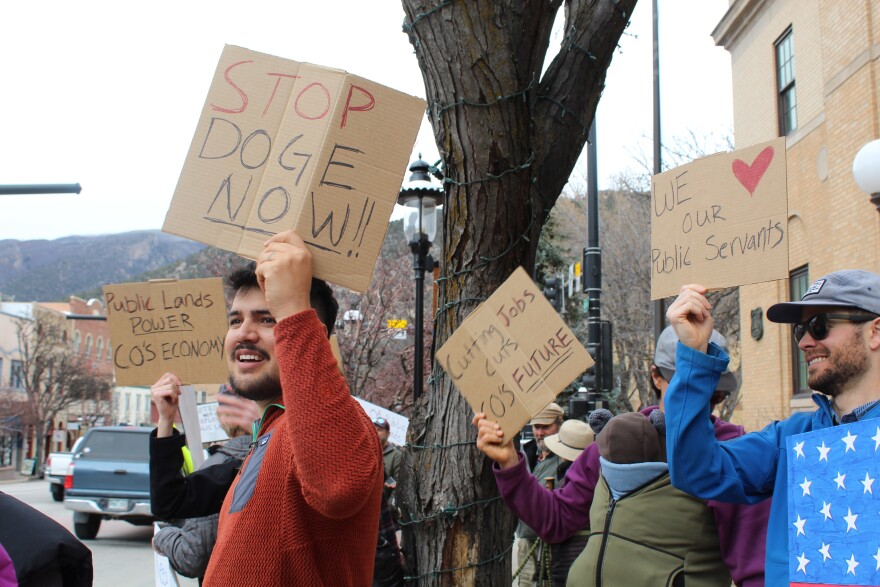A judge has ruled that five federal agencies must reinstate probationary workers laid off during mass firings by the Trump administration in February.
That’s big news for federal land management agencies in the west, like the Bureau of Land Management and the U.S. Forest Service, many of whom are preparing for a busy summer tourism season.
The news was well-received outside of the White River National Forest’s Supervisor’s Office in Glenwood Springs, CO, where people rallied on Thursday, March 13, 2025. At its peak, there were about a hundred people gathered on the sidewalk outside the federal building. They held signs with slogans like “keep public lands in public hands” and “honk if you love public lands.” As intended, the signs drew honks from rush hour traffic on State Highway 82.

The White River is the busiest national forest in the country, boasting multiple ski resorts and destinations for hikers, mountain bikers, rock climbers, anglers, and hunters, spanning over 2.2 million acres.
“It's not just one thing,” said Carbondale resident Sheehan Meagher. “I think that people think about fires but it's trash, it's campsites, it's selling permits, it's education. It's working with other agencies to lead educational opportunities, managing logging projects, stuff like that.”
Like the dozens of other attendees, Meagher came to support federal public land managers and workers who were laid off en masse by the Trump administration in February.
Meagher used to work for the White River National Forest. He said even when he was with the agency a couple years ago, employees were stretched thin.
“I saw what a small team has to do in terms of clearing trails for people to be out in the public,” he said. “The team that's responsible just for the Maroon Bells and the campsite is huge, and the pay is not great.”

Just hours before this rally, a federal judge issued a ruling, ordering federal agencies to reinstate workers who had been laid off — mostly probationary workers, or people in their first year or two of their new positions. But Meagher says there’s still so much uncertainty for these workers — many of whom make minimum wage.
“Making $16 an hour doesn't pay the bills,” he said. “These people are not, you know, making $8 million a day like Elon Musk on government subsidies. They're working class people that are doing what they love, what they’re passionate about.”
He’s worried that if they do return to their jobs, it’ll be in an environment hostile to their mission.
“And it makes me question whether I would ever want to get back into that role,” he said.
Glenwood Springs city councilor Jonathan Godes also came to support federal land managers. While he was glad to see that people could be reinstated, he said it’s an example of the administration’s dysfunction.

“To lay off people with a fell swoop and then have to hire them back, is just really the dumbest, most inefficient way of running a business, of running an economy that I think you can really possibly think of,” he said.
Godes added that the instability caused by the Trump administration’s swings and orders hurts the local economy.
“This impacts everybody that uses public lands,” he said. “What happens to... part of the economy in Western Garfield County if we cannot process those federal oil and gas permits? It impacts the rock climbers and the mountain bikers. It impacts ATV users and snowmobile users.”
Glenwood Springs is the seat of Garfield County, which is comprised of over 60% federal lands. Neighboring counties are also home to large swaths of public lands. More than 80% of Pitkin and Eagle counties are federal land, and over 70% of land in Mesa County is federally managed.

Erin Riccio is the advocacy director for Wilderness Workshop, a local conservation advocacy nonprofit that organized the rally. She said the federal ruling is a “victory” for public lands advocates.
“These types of things do move the needle,” she said. “There are leaders out there that are listening to us. And so I would encourage people to not give up hope and to keep faith and continue to use your voice and stand up for our lands and stand up for our community members because this stuff matters and it's important.”
Despite the ruling, Riccio said Wilderness Workshop isn’t going to take their foot off the gas in holding the administration accountable.
“We're going to be ensuring that important environmental protections stay in place,” she said. “We're going to be working to ensure that lands that our community members all care about stay protected, (that) our public lands stay in public hands because that is really important to folks and to our local economy.”
And people like Sheehan Meagher say it’s more important than ever to watch what comes next.
“Are they going to try to get rid of NEPA policy, where people have the ability to make public comments to protect our wildlands, or are they going to be a directive to just fund logging and special interests like oil and gas?”
But for the time being, he said it was encouraging to see so many community members standing in solidarity with federal workers, and their public lands.

“It's awesome to hear all those horns honking for people that are defending their national forests and the people that preserve them and steward them,” he said.
Between the Intermountain Region (which covers Utah, Nevada, and parts of Idaho and Wyoming) and the Rocky Mountain Region (which covers Colorado, the rest of Wyoming, Nebraska, Kansas, and South Dakota) USFS says there are 461 workers that were impacted by probationary cuts. It confirmed that those people were all placed in “pay status” and provided with back pay, from their date of termination. The agency did not provide further details on how the reinstatement process would proceed.

Copyright 2025 Rocky Mountain Community Radio. This story was shared via Rocky Mountain Community Radio, a network of public media stations in Colorado, Wyoming, Utah, and New Mexico, including Aspen Public Radio.



